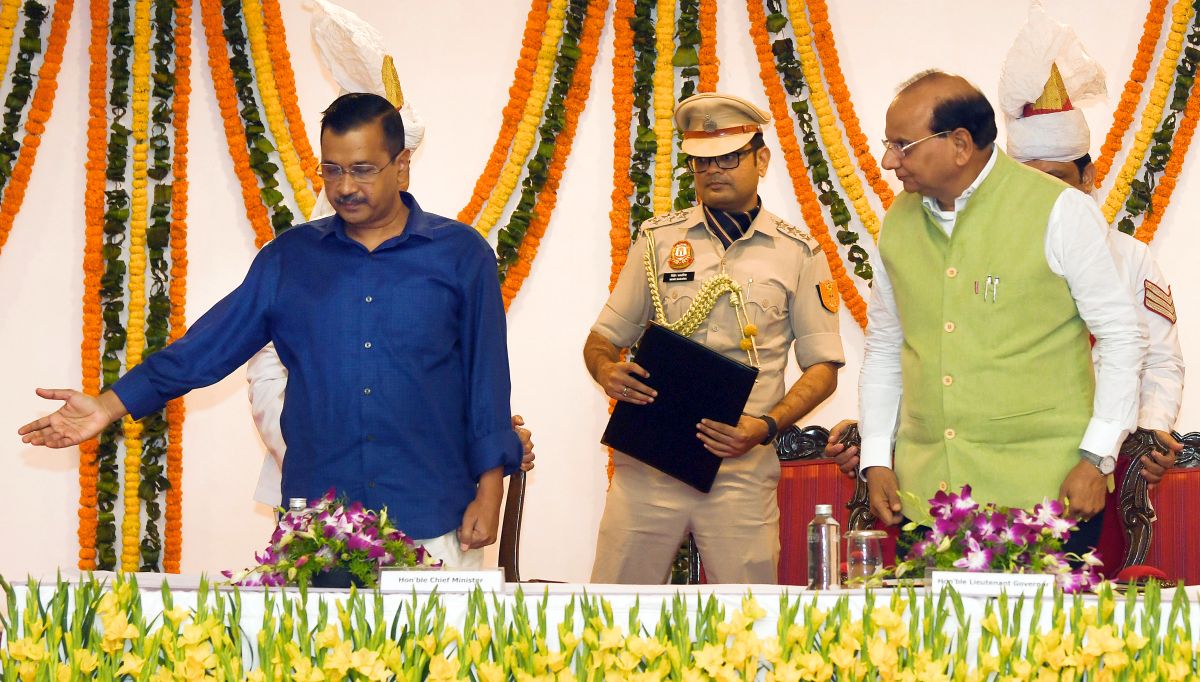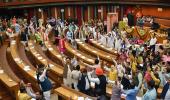The Centre has moved the Supreme Court seeking a review of its May 11 verdict which held the Delhi government has legislative and executive powers over services except for public order, police and land, contending the judgement ignores the fact that the functioning of the government in the capital "affects the nation as a whole".

In a determined effort to wrest control over the officialdom in the aftermath of the apex court order leaving it with just three subjects, the Centre promulgated an ordinance on Friday creating a National Capital Civil Service Authority to deal with service conditions, transfer and posting of officials.
The Centre has also filed an application in SC seeking an open court hearing of the review petition, saying the matter pertains to the functioning of the government machinery of the Government of the National Capital Territory of Delhi and "grave injustice would ensue" if the plea for oral hearing is not allowed.
"It is submitted that the said judgment suffers from an error apparent on the face of the record as it suffers from a fundamental fallacy inasmuch as it ignores that working and functioning of the capital government affects the nation as a whole," said the review petition, settled by Solicitor General Tushar Mehta.
It said the judgement further proceeds without appreciating that the nominee of the President, the Lieutenant Governor or the Central Government, both are also "manifestations of democracy" when compared to the elected government of Delhi.
A five-judge constitution bench headed by Chief Justice D Y Chandrachud had, in a unanimous verdict on May 11, sought to put an end to the festering dispute between the Centre and the Delhi government triggered by a 2015 home ministry notification asserting its control over services, holding the National Capital Territory administration is unlike other Union Territories and has been "accorded a 'sui generis' (unique) status" by the Constitution.
In a pushback, the Centre Friday promulgated an ordinance to create an authority for transfer and posting of Group-A officers in Delhi, a move the AAP government called a deception with the Supreme Court verdict on control of services.
The ordinance, which came a week after the apex court handed over the control of services in Delhi excluding police, public order and land to the elected government, seeks to set up a National Capital Civil Service Authority which will take decisions about not only the service conditions, transfer and posting of officers but also deal with disciplinary proceedings against Group-A officers from the DANICS cadre.
The lieutenant governor, whose wings the SC order had clipped substantially, will be the final arbitrator if a dispute arises over these matter within the authority, which will be headed by the Delhi chief minister. The city government's chief secretary and principal secretary home will be its other two members.
In its review petition, the Centre has said the verdict "suffers from errors apparent on the face of the record and fails to consider the case submitted by the review petitioner".
"It is submitted that central government is administered by the people of the entire country who have a vital and preponderant interest in the governance of the capital of the entire country," it said.
"The said judgment ignores the said argument put forth by the Union of India and same goes to the root of the matter as the same is critically connected to the question of the decision over Entry 41 List II of the Seventh Schedule of the Constitution of India," the plea said.
It said this is a unique feature which was to be kept in mind while providing for a holistic constitutional, legislative and administrative mechanism providing for the bureaucratic infrastructure of the capital, and significant emphasis was laid upon the same during the course of arguments for the same reason.
The plea said the verdict suffers from an error as it has not dealt with the arguments of the Centre that the Constitution has never contemplated a separate service cadre for Union territories.
"This is for the simple reason that a Union Territory is a mere extension of Union of India and persons working in Union territories are working in 'services and posts in connection with the affairs of the Union'," it said, adding the verdict substantially dilutes the powers of the LG as the administrator of Delhi.
"The judgment dated May 11, 2023, rendered by the Constitution bench suffers from an error apparent on the face of the record, in as much as despite accomplishing the status of NCT of Delhi as a Union Territory, the same effectively elevates the same to the status of a full-fledged state by giving legislative competence over all entries in List II and List III (except entries 1, 2 and 18 of the State List and Entries 64, 65 and 66 of that List in so far as they relate to the said Entries 1, 2 and 18) to its legislative assembly, irrespective of whether an entry is otherwise applicable to a Union Territory," the review plea said.
It said the judgement creates an anomaly, wherein by upholding that by virtue of Article 239AA (special provisions with respect to Delhi), the Parliament undeniably enjoys legislative supremacy, yet the council of ministers of GNCTD (Delhi government) would "now enjoy the executive supremacy, which effectively means that as regards the executive powers, Delhi despite being a Union Territory, and thus not a full-fledged state, has been elevated to the status of a state".
The plea said it is in the teeth of a nine-judge bench verdict which had held that notwithstanding the 69th Amendment introducing a legislative assembly for Delhi, the NCT of Delhi remains a Union Territory.
"Therefore, the impugned judgement has the effect of destroying the basic structure of the Constitution, wherein with the effect of conjoint reading of Article 73, 239AA and 246 the Union has overriding legislative as well as executive powers in respect of a Union Territory which is not a 'State'," it said.
Against the backdrop of frequent run-ins between the AAP government and the Centre's point man, the lieutenant governor, the apex court had on May 11 asserted an elected government needs to have control over bureaucrats, failing which the principle of collective responsibility will be adversely affected.










 © 2025
© 2025